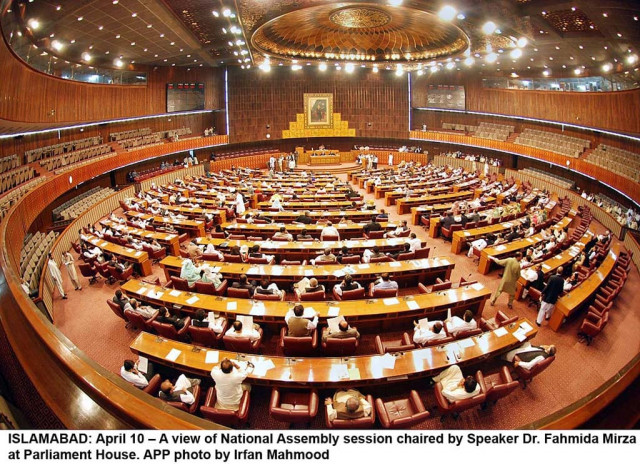In parliament, women punch above their weight
Eighty-nine female lawmakers have contributed to more than 44% of the agenda.

Women have contributed to more than 44 per cent of the agenda, almost three times more than the proportion of their representation in the two houses. PHOTO: APP
This is revealed in a report by the Free and Fair Election Network (Fafen), which analysed orders of the day of the National Assembly between June 1, 2015 to February 26, 2016 and the Senate between March 12, 2015 and March 11, 2016.
Women treated as ‘second-rate’ parliamentarians, says Dr Nafisa
According to Fafen, throughout the current term women MPs have contributed to parliamentary business through questions and calling attention notices, as well as motions on issues of public importance and private member’s legislation.
The women legislators individually or in collaboration with their male counterparts sponsored 33 of a total of 54 private member bills that appeared on the order of the day of the two houses during the reporting period.
Of these women-sponsored bills, 25 were referred to the relevant standing committees after their introduction in the two houses while six were dropped due to the absence of the movers.

In the lower house, as many as 11 private members’ bills moved by the women MNAs were allowed to be introduced and referred to the relevant standing committees. Another 11 bills jointly moved by female and male members were also referred to the standing committees.
Female presence in parliament
There were five bills, moved by women lawmakers, which were dropped due to the absence of the relevant MP on the day of their introduction. The lower house also rejected two bills sponsored by a woman legislator.
The proposed bills addressed a broad array of the issues of public interest. Five of the bills sought to amend the Constitution. They included the one seeking to enhance the minimum age for child labour from 14 to 16 years and other proposing social security to be recognised as a fundamental right.
In the Senate, as many as three private members’ bills moved by the women senators were allowed to be introduced and referred to the relevant standing committees.
One of these bills was related to the protection of the rights of working women and another sought to criminalise the practice of barring women from voting. However, one bill was dropped due to absence of the lawmaker on the day of its introduction.
Iran's new parliament has more women than clerics
The Senate also passed two private members’ bills during the reporting period – one related to the employment rights of domestic workers introduced in 2013 and the other related to compulsory vaccination and protection of health workers in Islamabad introduced in 2015.
The upper house also passed eight bills for speedy justice in January 2016. However, none of the bills have been approved by the National Assembly.
The Pakistan Health Research Council Bill, 2015, was the only government bill – introduced by a female legislator of the PML-N, Saira Afzal Tarar – that was passed by the NA.
Meanwhile, ANP lawmaker Sitara Ayaz sponsored the highest number of (7) resolutions in the Senate, of which three were adopted by the house. Ayaz was also the most punctual member among women senators, attending 92 days out of 103 sittings.
Published in The Express Tribune, July 11th, 2016.



















COMMENTS
Comments are moderated and generally will be posted if they are on-topic and not abusive.
For more information, please see our Comments FAQ